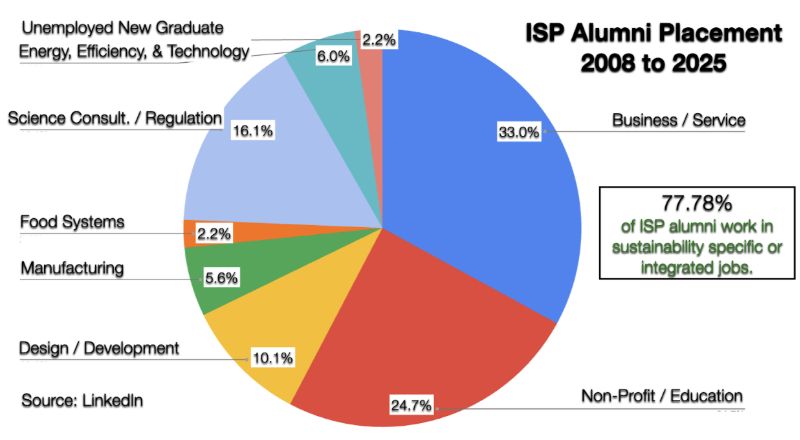Program Overview
Respond to a changing planet by leading initiatives to implement sustainable practices. Learn the science and environmental and social governance (ESG) of sustainability to help both businesses and people transform casual behaviors into mindful habits. Explore the broader field of sustainability, choose a concentration or customize your own emphasis. Professionals from almost any field can earn leadership roles in this rapidly growing market.
Lipscomb’s Master of Science in Sustainability combines environmental studies, business management and social sciences to prepare students from almost any discipline for a range of career paths. Study under academically credentialed and real-world sustainability practitioners. Gain field experience to see how theories become tangible and problems become solutions. Bond with your cohort and network with numerous guest experts and join a growing discipline that impacts every sector.
Program participants can customize their studies for almost any discipline or specialize in green buildings and sites, renewable energy, business metrics such as ESG and more. Convenient night classes, hybrid learning options, and a flexible rate of courses allow you to work full-time and study at a manageable pace in your busy life. Our sustainability degrees and certificates can equip you to improve your and our future.
Sustainability Program Outcomes
With a sustainability degree from Lipscomb, you will be prepared to implement sustainable practices and lead others in environmentally-conscious initiatives. Our program provides you with the theoretical knowledge and practical skills needed to make positive change in whatever career path you take.
Upon completion of this program, you will have the ability to:
- Develop foundational knowledge to pivot as sustainability changes
- Recognize technical applications and practices
- Justify the best technical applications and practices for your discipline
- Effectively communicate knowledge and applications
- Apply an application/practice to solve a problem within your discipline
Why Earn Your Sustainability Degree at Lipscomb University?
As the first sustainability program in the southeast, Lipscomb is able to give you the skills and connections you need to make a difference. Our program is designed to be easily accessible and flexible for working students while still providing comprehensive education and experience in sustainability. Personalize your educational path to combine your career with your passion for sustainability. Collaborate with peers, distinguished professors, and leaders in Nashville to envision a brighter future.
Admissions Requirements
A four-year undergraduate degree, background courses in business or environmental sciences, as well as prior relevant work experience, will most enhance the student experience, but are not necessary for successful completion of the program and professional advancement. In addition to meeting all Lipscomb University requirements for admission, each applicant to the graduate program in sustainability must submit the following:
- Application Form. Each applicant must complete an application form. The application form is available at Graduate Admissions. Click on “Apply by Program” to complete the online application.
- Application Fee. Each application should be accompanied by a $50 nonrefundable application fee.
- No Standardized Exam Required.
- Writing Sample. Students must submit a brief statement of interest and a writing sample that demonstrates clarity of thinking, reasoning ability, logic, and strong writing and communication skills. The statement of interest should summarize why the proposed course of study is desired, general learning objectives, and career goals. The writing sample should be an academic or professional document that has been previously written and perhaps evaluated in an academic or professional setting. Previously published work may also be considered.
- References. Two letters of reference are required: one academic and one character reference.
- Official Transcript(s). Each applicant must submit an official transcript, showing degree conferral when appropriate, from all schools attended.
- Health Form. Upon acceptance, each applicant must submit a completed health form signed by a health care provider. (To print a copy of the health form, visit www.lipscomb.edu/healthcenter/forms.)
- FERPA. The Family Educational Rights and Privacy Act afford students certain rights of access to educational records; even if you are independent of your parents, you must submit this form prior to enrollment.
- TOEFL. The Test of English as a Foreign Language is required for international students. (See section titled International Students for more information).
Note: The above referenced materials support a successful “final review” admission score equal to or greater than 30 points. Additional assessments may be provided for lower scores. All application items should be submitted to the office of graduate admissions at Lipscomb University no later than 30 days before the beginning of the month in which the student plans to enroll. Candidates pursuing the dual degree must meet admission requirements for both the sustainability program and the MBA program.
Courses
Tuition & Aid
Tuition for sustainability courses (includes text books):
- $1,091 per credit hour for On-Campus courses
- 18% discount for fully Online courses (online students may also visit live classes when desired)
Students may enroll in courses in any of the following fashions:
- 100% On-Campus courses
- 100% Online courses
- 100% Asynchronous courses
- A HyFlex mix of the above as a "hybrid student"
Payment is due prior to each class or at the start of the term.
Note: Graduate tuition rates may increase annually, effective at the start of the summer term 2023.
Alumni placement
Notable Alumni
Faculty to student ratio
Our Faculty
Instructors are subject practitioners
Career Paths
Natural Sciences Managers
Natural Sciences Managers both managers and lead scientists. They oversee the efforts of scientists working on sustainability issues. For example, if there are multiple scientists, such as a chemist, atmospheric scientist, and an environmental scientist working on a large project, the science manager will oversee and coordinate the efforts of the other scientists.
Engineers
Engineers who work in sustainability devise technical solutions for reducing waste and cutting costs. They also might be responsible for developing methods to increase safety and to reduce the risk of illness and injury for a company's employees.
Business Operations Specialist
Business operations specialists is a broad category that includes recycling coordinators and energy auditors. Firms recycle many of the materials used in production and operations, such as excess packaging, office paper, used chemicals, and scrap metal. Energy auditors, also known as energy raters or energy consultants, help prevent energy waste by inspecting buildings to find areas of air leakage and advising customers on how to fix and prevent leaks.
Accountants and Auditors
Accountants and auditors measure the impacts of sustainability programs. They determine the monetary savings and costs and may measure non-monetary aspects, such as environmental performance and the amount of waste reduction.
General and Business Operations Managers
General and operations managers work to ensure that sustainability strategies are implemented in day-to-day operations and that any sustainability measures are incorporated into the production process.
Construction and Compliance Managers
Construction managers supervise green building and site development processes and costs. Compliance officers manage eligibility and conformity with laws, regulations, and third-party green certifications or recommend how to exceed them.















